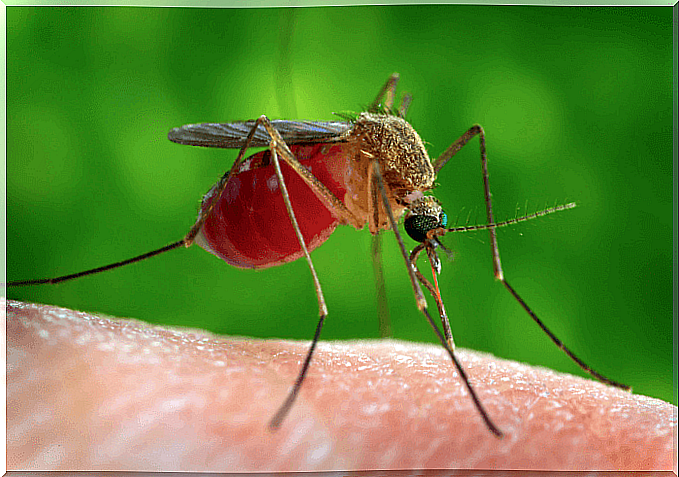What Is West Nile Virus And How Does It Affect Pregnancy?

The West Nile virus is an infection that is spread through the bite of a mosquito and generates, mainly, an inflammation known as “encephalitis”.
The time when there are greater risks of infection is summer. This is because people spend more time outdoors and, on the other hand, the climate favors the survival of mosquitoes and insects in general. Therefore, it is necessary to be careful and take the necessary preventive measures to avoid contagion.
However, the West Nile virus can affect the nervous system in such a way that it can cause death if medical attention is not received in time.
Encephalitis, inflammation of the brain
This virus is known by the acronym WNV, and it is classified as a recent onset disease that has been registered since 1937 in Africa, 1957 in Europe and 1999 in the USA.

The West Nile virus begins to manifest itself through mild ailments, such as fever and headache. Because these symptoms are so common, they go unnoticed and this makes it difficult to diagnose a major infectious process.
West Nile virus symptoms
However, from fever and headache, if the necessary medical attention is not given, these symptoms can progress to a much more intense and evident ailment. Among the most common symptoms are:
- Fatigue.
- Headaches
- High fever.
- Rash.
- Conjunctivitis.
- Muscular weakness.
- Inflammation of tendons.
- Stiff neck muscles.
- Lack of coordination of members.
- In severe cases, the virus can cause strokes and damage neurons, thereby affecting body functions.
How does it affect during pregnancy?
The latest research has shown that West Nile virus can affect the mother during pregnancy. Therefore, the fetus will be affected and possibly have or develop some (or more) diseases at birth.
According to the Center for Disease Control, a percentage between 7% and 10% of babies born to infected mothers had serious birth defects. The most prominent conditions are: cleft palate and Down syndrome.
The same study also indicates that the complications and risks seem to depend on the moment in which the person has been infected with this virus during the first, second or third trimester of pregnancy.
And although there is still much to discover, it is believed that the West Nile virus is responsible for many cases of various malformations evidenced both in the prenatal stage and at the time of the baby’s birth.
Appearance of symptoms and care
They usually appear between 3 and 14 days after being bitten by a transmitting mosquito, this is the most common cause of contagion.
Some medical procedures such as transfusions or transplants present minimal risk, and if you are breastfeeding your baby, the risk remains minimal.
In most cases, pregnant women will require supportive treatment, in which they will be given intravenous fluids and blood tests will be done to detect any changes that could affect their health and that of the unborn baby.

How to prevent the spread of this virus?
Obviously measures must be taken depending on the area where you live. Among them a pest control, as exhaustive as possible, and also use repellants or natural antibiotics.
Also, it is important not to expose yourself in the hours or areas most prone to activity of these pests. On the other hand, you should avoid stagnant waters and if a dead animal is found on your property or nearby, it must be buried or cremated.
If your house is in the country and they have equine animals, try not to frequent those areas because they have been a common carrier source. In other words, horses, when bitten by mosquitoes, become infected and this can, in turn, spread the contagion to humans.
And if the case is that you are pregnant, you should exercise extreme caution. Unfortunately, there is little to do if you have already caught the West Nile virus. So it is best to exercise caution and take all available prevention measures.










